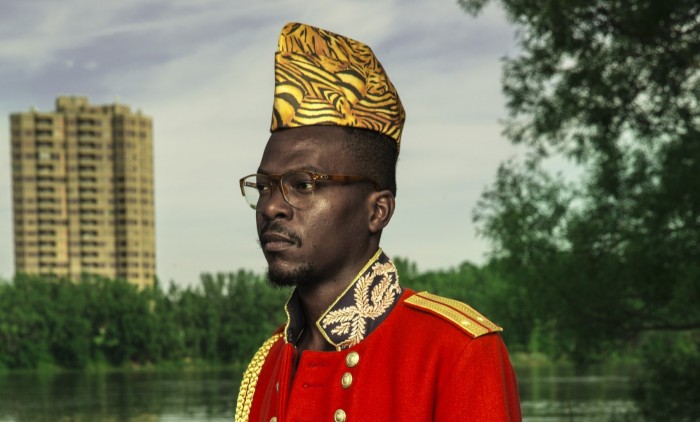On stage, Pierre Kwenders is a firecracker. He moves non-stop—dancing to the rhythm of his set, laughing between verses, and engaging his guest performers in a three-way can-can. Yet in person, the energetic persona fades, and he is much more reserved.
“In real life I’m not Pierre Kwenders, I’m José Louis,” Kwenders stated behind thick, circular sunglasses. “On stage I’m freaking out and jumping around but in real life I’m a quiet guy.”
Kwenders was born in 1985 in Zaïre—now the Democratic Republic of the Congo—where he lived until immigrating to Canada at 16. Despite having now lived in Canada for 14 years without having yet returned to his home country, Kwenders maintains prominent links to his home, both on stage and off. When performing, he displays what he calls the “flag of the [Pierre Kwenders] PK Nation,” an emblem laden with Central African imagery.
“I was born when it was Zaïre and I really really like that flag,” Kwenders claimed. “Those two countries, [Angola and Zaïre], are part of the Bantu Empire, so I wanted to have that link between the flag and the idea of the Bantus.”
Kwenders makes a conscious decision to blend different histories, regions, and sentiments in his songs in a way that makes people feel at ease.The process behind it is undeniably effortless, and can best be understood in Kwenders’ description of how he decides which language he should use for his lyrics (he performs in five languages in total).
“It’s natural, it [comes] when I hear a sound and that sound inspires me to sing in a specific language,” he explained. “For instance, in ‘African Dream,’ which has a lot of percussion, that reminded me of one of the languages in the Congo, which is Tshiluba.”
Despite performing in so many different languages and incorporating a myriad of different melodies—from Congolese Rumba to electro pop—in his music, the end product is designed to be approachable and unifying. Most of Kwenders’ songs focus lyrically on “love, happiness, peace, and some sadness,” but it’s not the lyrics that Kwenders wants to emphasize; rather, it’s the feeling a listener gets.
“[I] was listening to a lot of Michael Jackson and didn’t know a word of English, but I was feeling something out of it,” Kwenders remembered fondly of his childhood, a goal he tries to replicate as a musician. “If with my music I am able to make people feel the same way of when I was young listening to a foreign singer and not understanding a word […] then that’s the most important thing.”
Pierre Kwenders’ music, then, is worldly in nature: It pointedly draws on sounds from across the world and blends them into relatable songs for anyone listening. But, according to Kwenders, it is not ‘World Music’, and should certainly not be categorized as ‘World 2.0,’ a term used to classify popular music that originates in Africa. If he had to classify it at all, he would call it “afro-futurism.”
“The best way [to classify music] would be just to put everybody in the same category,” he explained. “There’s a lot of people out there who just love music and they don’t care. I think we should just let people decide what they like.”
Kwenders’ unifying sound is gaining traction in Canada—he was a shortlisted nominee for the Juno Award for World Music Album of the Year and a longlisted nominee for the 2015 Polaris Music Prize. For Kwenders, it’s less about the recognition the music brings and more about what the music creates—a screaming, energetic crowd at Osheaga, for instance. This raw commitment to the essence of music, combined with Kwenders’ clear talent as a writer and performer, should make him a household name.
“You have to find your own place, and find your own identity in the world,” Kwenders said. “Music is a sound, it’s what you do with an instrument, it’s what you play. Whatever sound comes out, it is still music.”










Pingback: Defining Pierre Kwenders | The McGill Tribune | Monique Charles